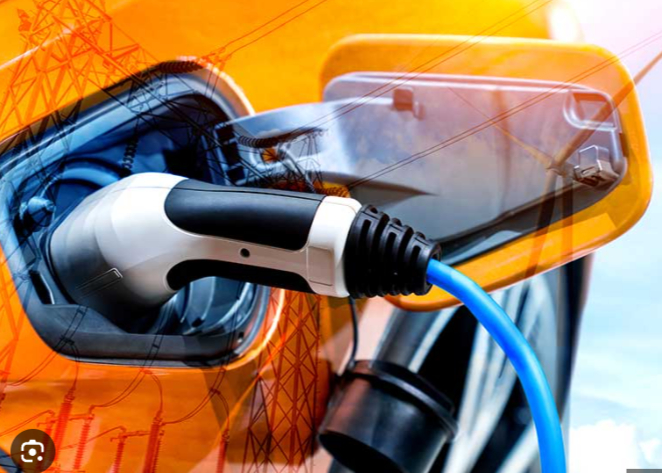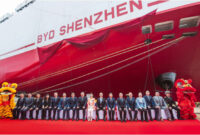President Donald Trump’s implementation of tariffs has caused major disruptions across multiple facets of the global economy, particularly impacting the auto industry, where substantial investments aimed at electrifying production in the United States are now in jeopardy.
Here’s what consumers need to know regarding the effects of tariffs on electric vehicles.
What is the current status of EV adoption in the U.S.?
In 2024, electric vehicles represented approximately 8% of new car sales in the United States, per data from Motorintelligence.com.
Some of these sales can be linked to increased tax incentives for EV purchases, a policy from the Biden administration that boosted consumer interest.
Tesla maintained the largest share of the U.S. EV market in 2024 at 48%. However, this share has decreased over recent years, as companies like Ford (7.5%), Chevrolet (5.2%), and Hyundai (4.7%) began to introduce a broader range of electric models at more competitive price points, according to Kelley Blue Book.
Electric vehicles continue to be pricier than traditional gasoline-powered vehicles. According to Kelley Blue Book, new gasoline cars had an average sale price of $48,039 last month, while EVs averaged $55,273.
Tariffs compound the financial challenges of an already unpredictable EV transition, according to Vanessa Miller, a partner in litigation focused on automotive manufacturing at Foley & Lardner.
Biden’s tax incentives effectively necessitated that automakers increase the amount of EV components sourced from the U.S. or allied nations in the upcoming years for their vehicles to be eligible. Automakers have been striving to establish a domestic EV supply chain, resulting in significant investments toward these initiatives.
Among the EVs manufactured in the U.S. are models from Tesla, the Ford F-150 Lightning, and others. Tesla may be less susceptible to these changes due to a larger proportion of its vehicles being produced domestically.
Even with industry growth, tariffs will cause sustained high costs for both manufacturers and consumers, potentially increasing prices for many components of EVs that are still imported from China and other countries. China outpaces the U.S. in areas like critical minerals for battery production and overall EV manufacturing.
Automakers had already started to scale back their ambitious electrification goals due to diminishing federal support and monetary constraints, particularly on the less profitable segments of their operations.
What implications do tariffs have for EV pricing and availability?
Rising costs could push consumers toward the used car market, although they are unlikely to find considerable relief there.
If fewer vehicles are purchased, automakers will need to refocus their investments and production efforts. This will direct resources toward the vehicles that consumers prefer and that yield higher profits. While automakers currently lose significant amounts of money on each EV made and sold, they profit from high-demand, fuel-inefficient pickup trucks and SUVs.
These manufacturers “have invested a certain amount in EVs, and it would likely be even more impractical to completely abandon them than to adjust production to a new level that remains feasible,” remarked Karl Brauer, an executive analyst at iSeeCars.com. That viable production level “will certainly be less than it was,” he noted.
Producing fewer EVs will not contribute to a decrease in their costs in the near future.
Albert Gore, executive director of the Zero Emission Transportation Association, expressed in a statement that the EV and battery sector is actively working to ensure the growth of the American automotive industry and that his organization will collaborate with the administration on effective trade policies.
“Tariffs imposed on our long-term trade partners, many of whom have invested billions into U.S. manufacturing, creates uncertainty and risks within an industry that is generating jobs and offering new economic prospects for communities nationwide,” Gore stated.
What other impacts have Trump’s policies had on U.S. EV growth?
Trump has already significantly altered federal EV policies. He campaigned with a promise to eliminate what he referred to as Biden’s “EV mandate.”
Although Biden’s EV initiatives did not obligate automakers to manufacture EVs or consumers to purchase them, they incentivized producers to expand their electric vehicle lineups in the years ahead. In his early days in office, Trump canceled Biden’s goal of having 50% of all new vehicles sold in the U.S. be electric by 2035.
Under Biden, regulations from the Environmental Protection Agency and the National Highway Traffic Safety Administration regarding greenhouse gas emissions and fuel efficiency were set to become increasingly strict, but automakers could still meet these standards by selling a growing number of EVs alongside more efficient gasoline vehicles. Trump’s administration is currently reviewing these emissions standards.
He also appears poised to attempt the repeal of tax incentives.
China’s car manufacturers may unexpectedly gain from U.S. President Donald Trump’s trade conflict as a 25 percent tariff on imported vehicles and auto components is implemented on Thursday, analysts suggest.
The White House contends that the tariff is essential for safeguarding the U.S. auto sector and bolstering the nation’s industrial foundation and supply chains.
According to the Bureau of Economic Analysis, the U.S. imported $475 billion worth of automotive parts, engines, and vehicles last year, mainly from Mexico, Japan, South Korea, Germany, and Canada.
Since Trump initiated his first trade war in 2018 and imposed tariffs on $380 billion worth of Chinese products, China’s involvement in the U.S. auto market has been limited.
In 2024, Chinese-made “light vehicles” – which includes cars, vans, and motorcycles – accounted for only 0.4 percent of light vehicle sales in the U.S., based on data from automotive market research firm JATO Dynamics.
This limited market presence is primarily attributed to low brand awareness of Chinese automakers in the U.S. and a 100 percent tariff enforced last year by former President Joe Biden.
Additionally, beginning in 2027, the U.S. will prohibit the sale of any hardware or software for “connected vehicles” manufactured in China on the grounds of alleged national security.
These technologies, often found in electric vehicles (EVs), allow cars to share data through Bluetooth, Wi-Fi, or satellite connections.
Sam Fiorani, the vice president of global vehicle forecasting at AutoForecast Solutions, mentioned that Chinese automakers are not as immediately impacted by the U.S. tariffs compared to their global rivals, which could offer them a long-term edge.
“With European, Japanese and South Korean brands burdened by the costs of the U.S. market, Chinese brands are now facing diminished competitors. The operating costs for every automaker in that market will rise due to the tariffs, but Chinese automakers don’t rely heavily on U.S. revenue,” Fiorani stated in an interview with Al Jazeera.
Chinese manufacturers could also gain an advantage as their rivals face increased costs from the tariffs, possibly making them more competitive in other markets, Fiorani noted.
Experts predict that the most significant advantages will be seen in the EV sector, even while they remain excluded from the U.S.
China leads in both EV manufacturing and battery production, and last year, BYD, a Chinese EV giant, surpassed Elon Musk’s Tesla in global annual revenue due to robust domestic sales.
Furthermore, China hosts six out of the top ten EV battery manufacturers worldwide.
While experts anticipate that Tesla will be less impacted by Trump’s tariffs, thanks to its lower reliance on foreign parts, they believe these tariffs will adversely affect potential competitors to BYD, such as Hyundai from South Korea, Nissan from Japan, and BMW and Mercedes from Germany.
Tu Le, the founder and managing director of Sino Auto Insights, indicated that Trump’s tariff policies and his push for onshoring manufacturing in the U.S. could render American brands less competitive in the long run, ultimately benefiting China.
“If the current trend continues for the U.S. auto industry, it might find itself uncompetitive in four years. Instead of investing in clean energy or charging infrastructure, they’re concentrating on bringing factories back to America,” Le told Al Jazeera.
However, Chinese suppliers of auto parts might bear greater repercussions from the tariffs than the automakers themselves due to their higher exposure to the U.S. market, according to Nick Marro, principal economist for Asia at the Economist Intelligence Unit.
“Chinese car manufacturers don’t sell many vehicles in the U.S., particularly due to the steep tariffs on electric vehicles, which are generally dominated by Chinese brands. Still, Chinese parts manufacturers have traditionally seen the U.S. as a significant market,” Marro explained to Al Jazeera.
“If disruptions happen, they will likely affect the intermediate components of the supply chain, potentially leading to cascading effects on the final assembly of U.S. vehicles.”
A crucial aspect regarding Trump’s vehicle tariffs is how they will impact Chinese and other foreign manufacturers who have shifted operations to Mexico to benefit from the USMCA and their closeness to the U.S. border.
After Trump’s 2018 trade conflict with China, many Chinese companies relocated to Southeast Asia and subsequently to Mexico to avoid tariffs.
Consequently, trade between Mexico and the U.S. has surged, with Mexico becoming the U.S.’s primary trading partner in 2023, surpassing China.
In 2024, Mexico supplied over 40 percent of U.S. auto parts, although many of these parts originated from Chinese factories that had established operations there over the past eight years.
While Mexico’s and Canada’s automotive sectors will receive certain exemptions from Trump’s 25 percent tariffs due to the USMCA, Marro from the EIU mentioned that Mexico is expected to reevaluate its Chinese manufacturing base as it seeks to negotiate lower tariffs.
During his presidential campaign last year, Trump made incorrect claims that Mexico allowed Chinese automakers to establish factories to ship finished vehicles to the U.S. without incurring taxes.
This continues to be a contentious issue, especially with Trump’s return to the White House in January.



